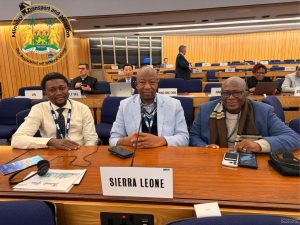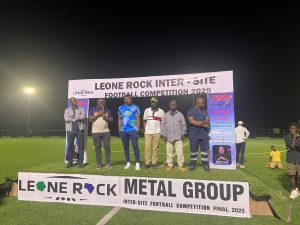Vice President Jalloh Advocates for Energy Transition to Boost Sierra Leone’s Development

At the second day of the Climate Resilience and Energy Transition Dialogue (CREST 2024) held at the Bintumani International Conference Center in Freetown on Tuesday, November 5th, 2024, Honourable Vice President Dr. Mohamed Juldeh Jalloh called for a transition of Sierra Leone’s energy sector from a utility-focused model to one that drives productive economic growth. He emphasized that the government must prioritize energy reform to put the country on a solid development trajectory.
Dr. Jalloh underscored that the sustainability of the progress made in key social sectors like education and health depends on enhancing the country’s production capacity, which, in turn, requires improved energy resources. He pointed out that the government needs adequate financial resources to continue making strides in the energy sector, which is crucial for the broader development agenda. “Energy is the key to unlocking the potential of the productive sector,” he stated, explaining that high electricity costs have increased operational expenses for industries such as mining, businesses, and manufacturers, ultimately raising the overall cost of doing business in Sierra Leone.
Vice President Jalloh emphasized that energy is the most vital factor in fostering economic growth and unlocking development opportunities. He recounted the challenges faced by Sierra Leone’s energy sector since 2018, when the Bio Administration inherited a struggling sector marked by low electricity generation, poor transmission and distribution capacity, and a huge electricity debt. He highlighted that the country’s energy sector was burdened by high technical and financial losses, which translated into high costs for businesses and increased stress on the economy.
Despite these challenges, the government has made significant strides in addressing the energy crisis. The Vice President outlined several key interventions and ongoing projects aimed at improving the energy landscape, including:
- The electrification of the CLSG (Côte d’Ivoire, Liberia, Sierra Leone, Guinea) power line from the Ivory Coast, which has been pivotal in expanding access to electricity across Sierra Leone.
- The launch of off-grid solar solutions to power schools, community health centers, and support small community-led businesses throughout the country.
- The increase in electricity supply to the Western Area, which now receives between 75 to 80 megawatts of power, a significant improvement from previous years.
Dr. Jalloh further noted that the completion of the 116 lines project will add an additional 116 megawatts to the Western Area grid, helping to eliminate the frequent power load shedding that has historically plagued the region.
While acknowledging the progress made, Vice President Jalloh emphasized that energy in Sierra Leone is still primarily treated as a utility, powering only social services like homes and small businesses. He argued that to truly transform the country’s development, energy must be viewed as a productive asset, one that drives economic growth, creates job opportunities, and lowers the cost of doing business.
He particularly pointed to agriculture as a sector that would benefit significantly from affordable and reliable energy, highlighting its role in food production, storage, and food system development. He mentioned that solar mini-grids have transformed rural communities, creating vibrant local economies that thrive even after dark by supporting small businesses and improving overall livelihoods.
The Vice President also highlighted the importance of reliable energy in healthcare, noting that the government’s UK-supported project is helping to power healthcare centers, ensuring that critical services, such as the storage of vaccines, are available for under-five children and pregnant women.
Dr. Jalloh stressed that energy is a critical component in addressing the broader challenges of fragility faced by many developing nations, including Sierra Leone. He defined fragility as a state marked by lack of jobs, climate change impacts, high food prices, and burdens on social services. He argued that investing in the energy sector is essential for moving the country out of fragility, as it directly impacts job creation, social service delivery, and the affordability of essential goods like food.
The Vice President also acknowledged that resources remain the biggest challenge for expanding investments in the energy sector. Despite this, he reiterated the government’s commitment to continued reforms and energy sector investments as part of its broader effort to promote sustainable economic development.
“Reliable energy is key to supporting countries to transition out of fragility,” Vice President Jalloh concluded. He called for continued collaboration with international partners and the private sector to overcome the financial challenges and accelerate the development of Sierra Leone’s energy infrastructure.





